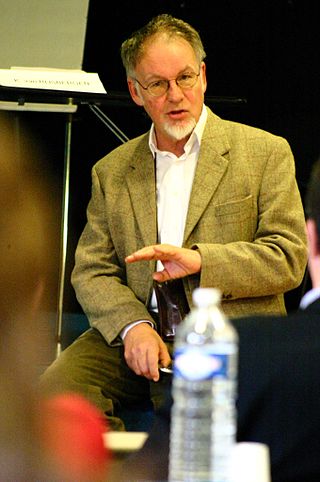Related Research Articles
Information retrieval (IR) in computing and information science is the process of obtaining information system resources that are relevant to an information need from a collection of those resources. Searches can be based on full-text or other content-based indexing. Information retrieval is the science of searching for information in a document, searching for documents themselves, and also searching for the metadata that describes data, and for databases of texts, images or sounds.
Cross-language information retrieval (CLIR) is a subfield of information retrieval dealing with retrieving information written in a language different from the language of the user's query. The term "cross-language information retrieval" has many synonyms, of which the following are perhaps the most frequent: cross-lingual information retrieval, translingual information retrieval, multilingual information retrieval. The term "multilingual information retrieval" refers more generally both to technology for retrieval of multilingual collections and to technology which has been moved to handle material in one language to another. The term Multilingual Information Retrieval (MLIR) involves the study of systems that accept queries for information in various languages and return objects of various languages, translated into the user's language. Cross-language information retrieval refers more specifically to the use case where users formulate their information need in one language and the system retrieves relevant documents in another. To do so, most CLIR systems use various translation techniques. CLIR techniques can be classified into different categories based on different translation resources:
The UKeiG Strix award is an annual award for outstanding contributions to the field of information retrieval and is presented in memory of Dr Tony Kent, a past Fellow of the Institute of Information Scientists (IIS), who died in 1997. Tony Kent made a major contribution to the development of information science and information services both in the UK and internationally, particularly in the field of chemistry. The name 'Strix' was chosen to reflect Tony's interest in ornithology, and as the name of the last and most successful information retrieval packages that he created.

Evelina London Children's Hospital is a specialist NHS hospital in London. It is administratively a part of Guy's and St Thomas' NHS Foundation Trust and provides teaching hospital facilities for London South Bank University and King's College London School of Medicine. Formerly housed at Guy's Hospital in Southwark, it moved to a new building alongside St Thomas' Hospital in Lambeth on 31 October 2005.

"MacArthur Park" is a song written by American singer-songwriter Jimmy Webb that was recorded first by Irish actor and singer Richard Harris in 1968. Harris's version peaked at number two on the Billboard Hot 100 chart and number four on the UK Singles Chart. "MacArthur Park" was subsequently covered by numerous artists, including a 1970 Grammy-winning version by country music singer Waylon Jennings and a number one Billboard Hot 100 disco arrangement by Donna Summer in 1978. Webb won the 1969 Grammy Award for Best Arrangement Accompanying Vocalist(s) for the Richard Harris version.

C. J. "Keith" van Rijsbergen FREng is a professor of computer science at the University of Glasgow, where he founded the Glasgow Information Retrieval Group. He is one of the founders of modern Information Retrieval and the author of the seminal monograph Information Retrieval and of the textbook The Geometry of Information Retrieval.

Susan Dumais is an American computer scientist who is a leader in the field of information retrieval, and has been a significant contributor to Microsoft's search technologies. According to Mary Jane Irwin, who heads the Athena Lecture awards committee, “Her sustained contributions have shaped the thinking and direction of human-computer interaction and information retrieval."
Martin F. Porter is the inventor of the Porter Stemmer, one of the most common algorithms for stemming English, and the Snowball programming framework. His 1980 paper "An algorithm for suffix stripping", proposing the stemming algorithm, has been cited over 8000 times.

"Could It Be Magic" is a song written by Adrienne Anderson and composed by Barry Manilow, inspired by Frédéric Chopin's Prelude in C minor, Opus 28, Number 20.

"Hot Stuff" is a song by American singer Donna Summer from her seventh studio album Bad Girls (1979), produced by English producer Pete Bellotte and Italian producer Giorgio Moroder and released as the lead single from Bad Girls in 1979 through Casablanca Records. Up to that point, Summer had mainly been associated with disco songs but this song also showed a significant rock direction, including a guitar solo by ex-Doobie Brother and Steely Dan guitarist Jeff "Skunk" Baxter. It is the second of four songs by Summer to reach number one on the Billboard Hot 100.

"No More Tears (Enough Is Enough)" is a 1979 song recorded by American singers Barbra Streisand and Donna Summer. It was written by Paul Jabara and Bruce Roberts, and produced by Giorgio Moroder and Gary Klein.

"Down Deep Inside" is the theme song from the 1977 film The Deep. The film's score was written by British composer John Barry and the lyrics to the main theme were added by disco singer Donna Summer. The track was released as a single and became a hit in some European countries, including the U.K. The film soundtrack LP also contained a slower tempo version of the song, and an extended version of the original later appeared on a CD version of Summer's 1978 Live and More album. The song was nominated for a Golden Globe Award for Best Original Song.

Karen Spärck Jones was a self-taught programmer and a pioneering British computer scientist responsible for the concept of inverse document frequency (IDF), a technology that underlies most modern search engines. She was an advocate for women in the field of computer science. She even came up with a slogan: “Computing is too important to be left to men.” In 2019, The New York Times published her belated obituary in its series Overlooked, calling her "a pioneer of computer science for work combining statistics and linguistics, and an advocate for women in the field." From 2008, to recognize her achievements in the fields of information retrieval (IR) and natural language processing (NLP), the Karen Spärck Jones Award is awarded to a new recipient with outstanding research in one or both of her fields.
Peter Willett is an Emeritus Professor of Information Science at the University of Sheffield, England.
W. Bruce Croft is a distinguished professor of computer science at the University of Massachusetts Amherst whose work focuses on information retrieval. He is the founder of the Center for Intelligent Information Retrieval and served as the editor-in-chief of ACM Transactions on Information Systems from 1995 to 2002. He was also a member of the National Research Council Computer Science and Telecommunications Board from 2000 to 2003. Since 2015, he is the Dean of the College of Information and Computer Sciences at the University of Massachusetts Amherst. He was Chair of the UMass Amherst Computer Science Department from 2001 to 2007.

Maarten de Rijke is a Dutch computer scientist. His work initially focused on modal logic and knowledge representation, but since the early years of the 21st century he has worked mainly in information retrieval. His work is supported by grants from the Nederlandse Organisatie voor Wetenschappelijk Onderzoek (NWO), public-private partnerships, and the European Commission.
Ingemar J. Cox is Professor and Director of Research in the Department of Computer Science at University College London, where he is Head of the Future Media Group, and he is Professor in the Machine Learning department at the University of Copenhagen. Between 2003 and 2008, he was Director of UCL's Adastral Park Campus.
Evaluation measures for an information retrieval (IR) system assess how well an index, search engine or database returns results from a collection of resources that satisfy a user's query. They are therefore fundamental to the success of information systems and digital platforms. The success of an IR system may be judged by a range of criteria including relevance, speed, user satisfaction, usability, efficiency and reliability. However, the most important factor in determining a system's effectiveness for users is the overall relevance of results retrieved in response to a query. Evaluation measures may be categorised in various ways including offline or online, user-based or system-based and include methods such as observed user behaviour, test collections, precision and recall, and scores from prepared benchmark test sets.

Maristella Agosti, is an Italian researcher and professor. Her research covers retrieval, user engagement, databases, digital cultural heritage, and data engineering. She has published more than 200 papers covering these areas. She also is the Professor in Computer Science at the University of Padua. She was granted the title of Professor Emeritus by Decree of the Italian Ministry of Education, University and Research. She is also a recipient of the Tony Kent Strix Award.
Katherine A. Rawson is an American cognitive psychologist known for her educational research on how to optimize learning, promote effective study strategies, and enhance metacognition. She is Professor in the Department of Psychological Sciences at Kent State University. She is co-editor of The Cambridge Handbook of Cognition and Education, which surveys research on teaching and study strategies that increase learning.
References
- ↑ Harman, Donna K. (2019-09-10). "Donna K. Harman". NIST. Retrieved 2019-10-11.
- ↑ "Donna K. Harman". The MIT Press. Retrieved 2019-10-11.
- ↑ "Tony Kent Strix Award Winners". CILIP. 2014-06-02. Retrieved 2019-10-11.